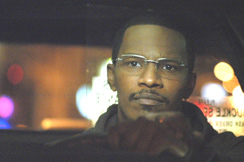| Collateral |
| |
 |
USA, 2004. Rated R. 111 minutes.
Cast:
Tom Cruise, Jamie Foxx, Jada Pinkett Smith, Mark Ruffalo, Peter Berg, Bruce McGill, Irma P. Hall, Javier Bardem
Writer: Stuart Beattie
Original Music: James Newton Howard
Cinematography: Dion Beebe, Paul Cameron
Producers: Michael Mann, Julie Richardson
Director: Michael Mann
LINKS |
This review contains a minor spoiler about a plot development that's pretty flippin' obvious from the get-go.
 he look is unmistakeable. It's the Michael Mann look; the look of Heat—slick, smooth, glossy, but not flashy or glitzy. It's a cool look, not a warm look, and the actors always look their best. The camera moves, smoothly, expertly, but not frenetically, to a deftly blended soundtrack of rock, dance, and jazz. It's the Miami Vice look, all grown up. There's no question about it; the man behind Miami Vice knows how to make a good-looking product. While not all of his movies have been unequivocal success stories (Ali), most of them, like The Insider and The Last of the Mohicans, have hit their mark.
he look is unmistakeable. It's the Michael Mann look; the look of Heat—slick, smooth, glossy, but not flashy or glitzy. It's a cool look, not a warm look, and the actors always look their best. The camera moves, smoothly, expertly, but not frenetically, to a deftly blended soundtrack of rock, dance, and jazz. It's the Miami Vice look, all grown up. There's no question about it; the man behind Miami Vice knows how to make a good-looking product. While not all of his movies have been unequivocal success stories (Ali), most of them, like The Insider and The Last of the Mohicans, have hit their mark.
Mann, as is perhaps appropriate given his name, is not a storyteller particularly interested in women. Rather, his work has explored the male psyche. Films like The Insider, Heat, and Manhunter have examined what drives certain men to do what they do. Mann's protagonists fixate on a goal and can't let go, no matter the cost. That's what causes them to become heroes and achievers, but usually as the cost of family and personal relationships. Women are often obstacles, not in the sense that they are the villains, but in the sense that they just don't get that a Man Has to Do What a Man Has to Do. Misogynist? Perhaps. Then again, there are plenty of movies that rail against men's incapability to understand women. Maybe there are core things about the male and female psyches that the other sex will never completely grasp.
No surprise, then, that Collateral is, like so many other Mann films, once again about two determined men with mutually exclusive goals. Or, to be completely accurate, about only one such man—initially. That man is Tom Cruise, in a fancy suit and artificially whitened hair, portraying a killer-for-hire named Vincent. Cruise is Collateral's star power. The film opens with him; all the marketing has focused on him. Yet Collateral isn't actually about him. Cruise is not the protagonist, but the antagonist—ideally the guy who tries to steal the movie, not the film's Big Star.

Jamie Foxx drives a cab in Collateral. |
Fortunately Jamie Foxx (of Ali and the upcoming Ray), by giving a far more profound and sensitively tuned performance than Cruise, steals the movie back and carries it on his shoulders though its excellent second act and improbable denouement.
Foxx is Max, the best cab driver in the whole world. He is a clean freak; he speaks Spanish; and he knows the best route to get anywhere and exactly how long it will take. Moreover, he has learned to read his passengers, such as prosecutor Jada Pinkett Smith, so perfectly he can guess what they do for a living.
Max is due to be shaken out of his assumptions and his routine. When Vincent enters his cab, Max takes him for what he claims to be: a businessman from out of town trying to close a real estate deal in one night, with five stops to make. Max's efficiency is what gets him into trouble, causing Vincent to offer Max six hundred dollars to be his driver for the evening, which appeals to Max's secret desire to launch a limousine company.
Max accepts Vincent's money, and soon learns Vincent's true profession when a victim crashes down on his windshield from above. That's when Vincent hijacks the cab and takes Max hostage, advising him to “adapt to the environment.” But Max has always been a pretty passive guy. He's shy. He has never actually done anything to realize his limo company dream. Taxi driving is supposedly just a “temporary” thing that he's been doing for over a decade. To get out of the situation, Max is going to have to take Vincent's advice, learning to be more assertive and adaptable—more like Vincent. Collateral holds out hope that the detective pursuing Vincent (Mark Ruffalo, all Guido-ed up with slicked back hair and jewelry) will bail Max out, but in the end, you just know that Max is going to have to become a Michael Mann Man.
Screenwriter Stuart Beattie's premise is clever, but for most of its running time, Collateral isn't concerned with being clever. There are some initial missteps, most notably the clumsy humanizing device of the tropical-island postcard that Max carries (he takes “a vacation” there several times a day), but the story is gripping and the stakes are high. Vincent and Max debate their lives and their goals, but their esoteric discussions have teeth—a visceral immediacy and real-world consequences that makes the verbal repartee relevant, vibrant, and alive—just as you would expect from a Mann movie.
Until the ridiculous coincidence.
The coincidence involving Cruise's last target is an easy one to pick up—the order of the cast credits gives it away, and it's foreshadowed via a seemingly unnecessary early juxtaposition. The movie remains fun, but the implausibility of the coincidence sucks all tension out of the film. In its third act, Collateral is a drama no longer. It's just a made-up story—a second-rate thriller that not even Mann's sophisticated filmmaking can fully redeem.
Review
© August 2004 by AboutFilm.Com and the author.
Images © 2004 Dreamworks, LLC. All Rights Reserved.


